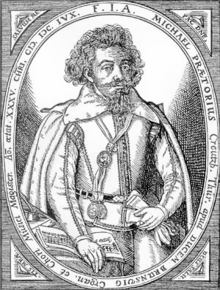Quempas
The Quempas is an early modern compilation of three Latin Christmas carols , namely Quem pastores laudavere and Nunc angelorum gloria , to which an extension (" trope ") occurs on the melody of Resonet in laudibus .
history
The oldest sources, including the Hohenfurt manuscript Ms. 28 , date from the 15th century; The individual songs are likely to be older, well probably the custom that in Christmas church services ( Midnight Mass , Christmas vespers or Mass on Christmas Day ) the first song (sometimes the second) line by line (solo and unanimously) alternating with students or student choirs (also polyphonic ), which were set up in all four corners of the church (“The Quempas is about”).
German versions have been documented since the 16th century, the best known being that of Michael Praetorius , Musae Sioniae 1607, with the German text "Den die Hirten praise sehre" by Matthäus Ludecus and "Today to be the dear angels" by Nikolaus Herman . In this version, the two songs are sung alternately in stanzas, each followed by the trope.
The custom of chanting Quempas also included other songs in addition to the original combination of songs and was an integral part of Christmas customs in many places , both in church services and on streets and squares.
Today the Quempas singing, which varies from region to region, is mostly no longer performed on Christmas morning, but on a Saturday evening or Sunday morning in the late Advent period. In the Erzgebirge the custom of "singing around" in the Christmas mass on Christmas morning has still been preserved. In some villages their own traditional melodies from the 17th and 18th centuries have been preserved until today.
Via the Erzgebirge composer Rudolf Mauersberger (1889–1971), this tradition also found its way into the liturgy of Christmas mass and Christmas vespers of the Dresden Kreuzchor .
In 1930 Wilhelm Thomas and Konrad Ameln published a collection of old Christmas carols under the title Das Quempas-Heft ( Bärenreiter-Verlag , Kassel, artistically designed by Helmuth Uhrig ) and thus stimulated the Quempas singing anew.
Original text
In the following full text, the three different song sources are indicated by indentation.
|
Latin text
Quem pastores laudavere, |
German text
Whom the shepherds praised |
Literal translation
He, whom the shepherds praised, to |
literature
- Konrad Ameln : Quem pastores laudavere . In: Yearbook for Liturgy and Hymnology . 11, 1966, pp. 45-88, JSTOR 24193586 , Facsimile Plate VII.
- Konrad Ameln, Wilhelm Thomas: The Quempas is going around. Past and future of a German Christmas rite . Bärenreiter, Kassel 1965.
- Andreas Marti : Listen, it sings and sounds with noise (Quem pastores laudavere) . In: Ecumenical song commentary on the Catholic, Reformed and Christian Catholic hymns of Switzerland. Freiburg CH / Basel / Zurich 2001–2009, unpag.
- Ingeborg Weber-Kellermann : The book of Christmas carols. Schott, Mainz 1982, ISBN 3-7957-2061-3 , pp. 123-130.
- Antje Wissemann [Ed.], Hilde Schwenn [Illustr.]: The new Quempas. Advent and Christmas carols . Bärenreiter, Kassel 2012, ISMN 979-0-006-52957-5 (search in the DNB portal) (editions for various occupations).
Other media
- Wolfgang Schneider, Torsten Seegert: Pomeranian Christmas - Review & rediscovery in a contemplative time , with the film DVD Rummelsburger Quempas . Heimat-Bild-Verlag, Gifhorn 2012, ISBN 978-3-942926-17-1 .
Individual evidence
- ↑ a b c Friedrich Blume (Ed.): Michael Praetorius. Complete edition of the musical works. Volume 7: Musae Sioniae. T. 7, (1609). Georg Kallmeyer Verlag, Wolfenbüttel-Berlin 1937, p. XI u. 173–177 ( online : sheet music and audio files in the International Music Score Library Project ).
- ↑ a b Evangelical Hymnal , Song No. 29.
- ^ Heinz Grosch, Johannes Thomas: THOMAS, Wilhelm. In: Biographisch-Bibliographisches Kirchenlexikon (BBKL). Volume 29, Bautz, Nordhausen 2008, ISBN 978-3-88309-452-6 , Sp. 1425-1433.
- ↑ Rev 5.5 EU
